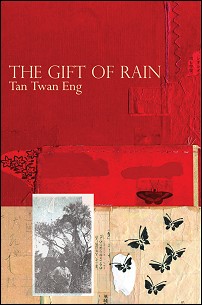This article has multiple issues. Please help improve it or discuss these issues on the talk page . (Learn how and when to remove these messages)
|
 First edition (UK) | |
| Author | Tan Twan Eng |
|---|---|
| Cover artist | Caroline Tomlinson for jellylondon.com |
| Language | English |
| Publisher | Myrmidon (UK) Weinstein (US) |
Publication date | 2007 (UK), 2008 (US) |
| Publication place | United Kingdom |
| Media type | Print & eBook |
| Pages | 448 |
| ISBN | 1-905802-04-8 |
| Followed by | The Garden of Evening Mists (2012) |
The Gift of Rain is the first novel by Malaysian novelist Tan Twan Eng. It was published in 2007 by Myrmidon Books in the United Kingdom and the following year by Weinstein Books in the United States, and was longlisted for the Man Booker Prize that year. [1]